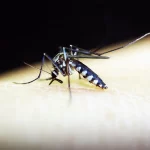Typhoid fever is a bacterial infection caused by the bacterium Salmonella enterica serotype Typhi. It spreads through contaminated food and water, and its symptoms include high fever, headache, stomach pain, and diarrhea.
Here are some safety tips to help prevent typhoid fever:
- Clean water and sanitation: Ensure that you have access to clean, safe drinking water. If you are in an area with questionable water quality, consider drinking bottled or boiled water. Avoid ice made from tap water and be cautious about consuming beverages with ice in such regions. Additionally, practice good hygiene and wash your hands thoroughly with soap and clean water after using the restroom and before eating.
- Eat safe food: Be cautious about the food you consume. Eat well-cooked, hot meals and avoid raw or undercooked foods. It’s best to peel fruits and vegetables yourself or choose fruits that have thick, intact skins. Avoid street food and unhygienic food vendors.
- Proper food storage: Make sure perishable foods are properly stored in a clean and cool environment to prevent bacterial growth. Refrigerate leftovers promptly and reheat them thoroughly before consumption.
- Hand hygiene: Regularly wash your hands with soap and water for at least 20 seconds, especially before handling food, after using the restroom, and after touching surfaces that may be contaminated.
- Vaccination: If you are traveling to an area where typhoid is prevalent, consider getting vaccinated against the disease. There are both oral and injectable vaccines available that can provide protection.
- Be cautious during travel: If you are visiting a region with a higher risk of typhoid, take extra precautions. Avoid consuming uncooked or partially cooked food, and stick to bottled or boiled water. Also, be cautious about the water used for brushing your teeth.
- Avoid close contact with infected individuals: Typhoid is contagious, so avoid close contact with anyone who has the infection. This includes sharing food, utensils, and personal items.
- Seek medical attention: If you suspect you might have contracted typhoid or experience symptoms such as persistent fever, headache, or gastrointestinal issues, seek medical attention promptly.
Remember, prevention is always better than cure. Following these safety tips can significantly reduce the risk of contracting typhoid fever. If you plan to travel to an area where typhoid is common, consult with a healthcare professional for personalized advice and vaccination recommendations.

Symptoms of Typhoid
Typhoid fever is caused by the bacterium Salmonella enterica serotype Typhi. The symptoms of typhoid can vary in severity and typically appear within one to three weeks after exposure to the bacteria.
Here are the common symptoms of typhoid fever:
- High Fever: A sustained high fever, often reaching 103-104 degrees Fahrenheit (39-40 degrees Celsius), is a hallmark symptom of typhoid. The fever tends to rise gradually over several days.
- Headache: Persistent and severe headaches are common in typhoid patients.
- Stomach Pain: Abdominal pain and discomfort are typical, often located around the belly button or in the upper right part of the abdomen.
- Weakness and Fatigue: Typhoid fever can cause weakness and a feeling of exhaustion, which may progressively worsen as the infection progresses.
- Loss of Appetite: Infected individuals may experience a loss of appetite and a reduced desire to eat.
- Constipation or Diarrhea: Some individuals may experience constipation, while others may have diarrhea. In some cases, these symptoms can alternate.
- Rose Spots: About a third of typhoid patients may develop “rose spots,” which are small, red, raised spots on the trunk and abdomen.
- Enlarged Spleen and Liver: The spleen and liver may become enlarged during the course of the illness.
- Generalized Aches and Pains: Muscle aches and body pains are common symptoms of typhoid fever.
It’s important to note that not all individuals infected with typhoid may exhibit all of these symptoms. Some individuals may have mild symptoms or even be asymptomatic carriers, meaning they can spread the bacteria to others without showing signs of the disease themselves.
If you suspect you or someone else may have typhoid fever, seek medical attention promptly. A healthcare professional can perform diagnostic tests and provide appropriate treatment to manage the infection. Typhoid fever can be a serious illness if left untreated, so early diagnosis and treatment are crucial.
Some more details about typhiod (WHO)
If you don’t like this article/post please share your feedback.





